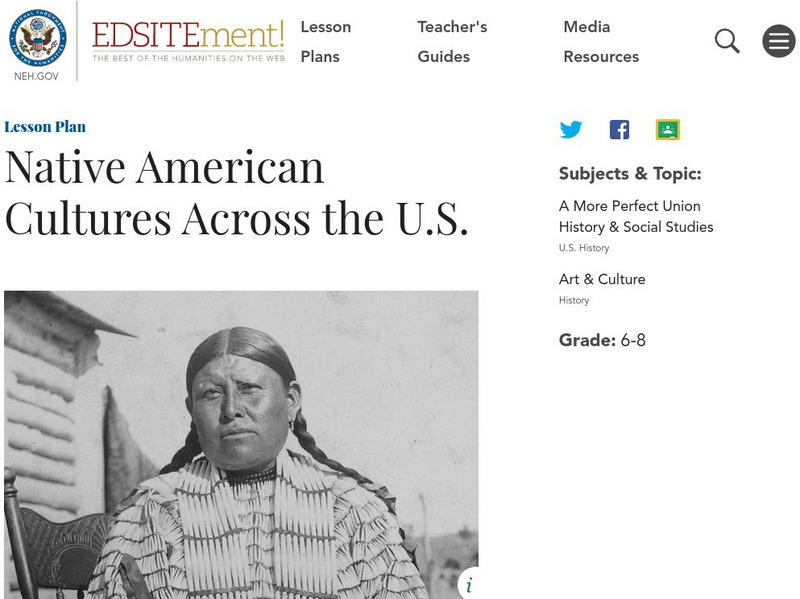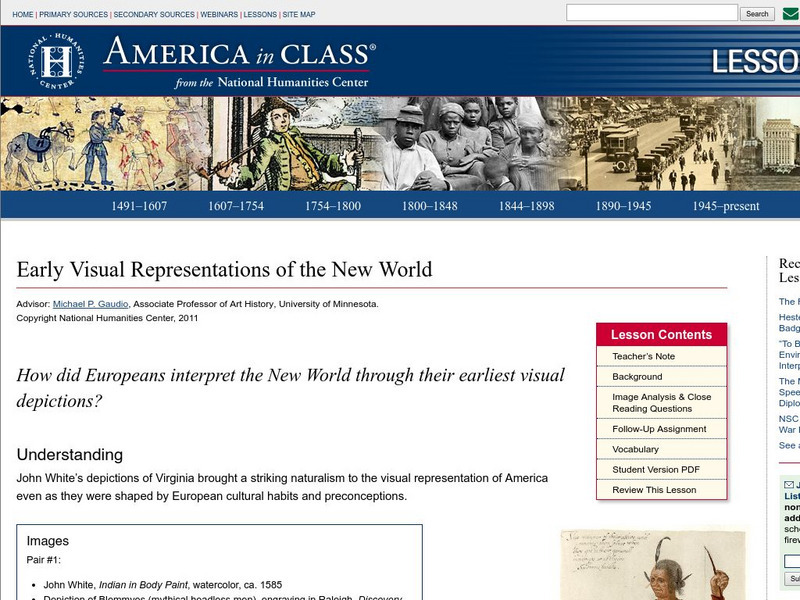Hi, what do you want to do?
Curated OER
IN STRAWBERRY FIELDS
The student will calculate wages of agricultural workers by the hour and by the piece.2. Share background material, and discuss the difference between gross pay and net pay and the difference between getting paid by the hour or the piece...
Curated OER
Working Watermelon
You're going to wish you had a watermelon for this lesson! Class members read about watermelons and make a salad in class to sample. They also perform estimates, measurements and calculations on a watermelon. They predict what percentage...
Curated OER
Helen Frankenthaler Biography
Learners examine the abstract art of Helen Frankenthaler. In this art analysis lesson, students complete a criticism of the aesthetics of the art, analyze the color use in the art, and research the history of abstract art.
Curated OER
Chinese Immigration in the Mid-19th Century
Students interpret historical evidence presented in primary and secondary resources. In this Chinese immigration lesson, students research the Chinese immigration between 1850 and 1882.
Curated OER
Taking a Stand - 1965 Selma-to-Montgomery Voting Rights March
Students examine the 1965 Selma-to-Montgomery Voting Rights March. They view pictures reflecting their perceptions of their most important rights as citizens, write journal responses, create collages illustrating courage, and read...
Curated OER
Global Change- Time and Cycles
Students study trees and their growth. In this investigative lesson plan students work in groups to reconstruct a 50 year climatic history using a simulated tree ring.
Curated OER
Arizona!! How the Heck Did I End Up Here???
Students research the historical background of the potato. In this potato research lesson, students cut out the important dates in potato history. Students make a timeline for the events.
Curated OER
CIVIL DISOBEDIENCE
Students use events of the time to illustrate the significance of the 1965 Selma-to-Montgomery Voting Rights March.
Curated OER
Living History
High schoolers analyze how historians are trying to keep history alive and preserve it for generations to come. They view some schools trying to save an entire culture and language from extinction. Students participate in history...
National Endowment for the Humanities
Neh: Edsit Ement: Native American Cultures Across the United States
Students explore different aspects of the cultures of the First Americans in this lesson plan. Stereotypes are often associated with Native Americans through movies and in the context of the Thanksgiving holiday. Specific information and...
National Humanities Center
National Humanities Center: America in Class: Early Visual Representations of the New World
A lesson that examines how Native Americans were portrayed by artists in the sixteenth century, whose aim was to convey their appearance to a European audience, and thereby encourage investment in future New World explorations. By...
Alabama Learning Exchange
Alex: Native American Acrostic Poems
In this lesson, young scholars will synthesize the knowledge they have acquired about early Native American tribes by creating and presenting an acrostic poem that incorporates pictures symbolizing important characteristics of the...
Lin and Don Donn
Lin and Don Donn: Language Lessons: Native American Lit.
Relevant resource links and ideas for lessons to teach Native American Literature also come with information on specific units, suggested lists of books, and Native American Poetry.
Other
Bringing History Home: Communities Long Ago
This Grade 1 unit explores U.S. communities in a historical context. By exploring their own community's buildings and services of both long ago and today, children in non-Native American communities are introduced to concepts of change,...
National Endowment for the Humanities
Neh: Edsit Ement: What Should a House Do
Site provides an extensive lesson plan that challenges students to compare early American houses to present day houses. Very comprehensive site with several activities that will assist students in understanding common features of houses....
Alabama Learning Exchange
Alex: Native Cultures in the Americas
This lesson plan is part of a project-based, hands-on unit in which children discover the native cultures that existed in the Americas prior to the arrival of explorers. The students will "become" part of their assigned culture through...
Alabama Learning Exchange
Alex: The Early Americas Civilizations Power Point
This lesson plan is for cooperative learning groups. This lesson plan will take place in the classroom and the computer lab. Students will create PowerPoints on the early Americas civilizations of the Hohokam, Anasazi, Mississippians,...
Texas State Historical Association
Texas State Historical Association: Prehistoric Texas [Pdf]
An activity guide where students refer to the Texas Almanac, which is free to download, for information needed to complete assigned tasks. In this lesson, students are asked to research the four stages of cultural development in early...
Alabama Learning Exchange
Alex: Creek War Journals
After a study of the Creek War, students will explore perspectives of families on both sides of the war. Students will compose journal entries from a selected social class of the era to develop and exhibit an understanding and...
PBS
Pbs: About All You Can Eat: A Feast at Plimouth Plantation
A lesson in the culinary delicacies of the Plymouth Plantation in 1627. In this integrated lesson, young scholars examine the history of foods eaten during this colonial era and prepare an actual meal based on what they have learned....
Alabama Learning Exchange
Alex: Extra, Extra!! Mary Rowlandson's Captivity Newscast
This lesson will be an interdisciplinary lesson that involves both English Language Arts and Social Studies (History). The lesson will be primarily technology-based and also project-based that will have the young scholars performing...
Louisiana Department of Education
Louisiana Doe: Louisiana Believes: Social Studies: Grade 5: Peace Treaty of Massasoit
Fifth graders develop and express claims through discussions and writing which examine the causes and consequences of historical events as they explore the relationships between early colonists and Native Americans.























